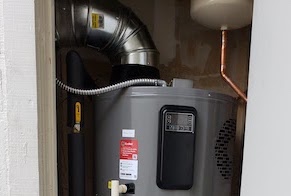This is going to be a pretty short blog post because it turns out it’s not all that interesting living with a heat pump water heater. It works, it’s quiet, you pretty much forget about it. When I ask my parents about theirs, it’s clear they haven’t given it any thought at all since it was installed. It just works. But I will cover the sound, the electricity use, and the cost of my installation in some detail for those who are interested.
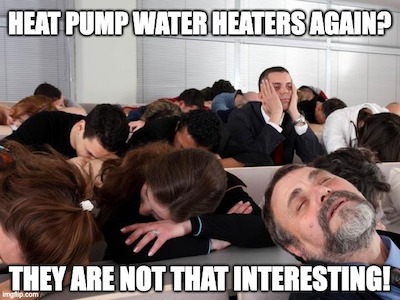
In May I installed an 80-gallon, 15-amp Ruud heat pump water heater in a closet in my garage, replacing a gas tank water heater that was in there. I got the 15-amp model to save room in the electric panel (vs the more traditional 30-amp model), and I got the large 80-gallon model “just in case”. (That was definitely overkill. A 65 gallon model would have been more than enough for our house.) When first installed it was louder than spec’d, but I reached out to Ruud and the contractor put in some sound-proofing as I described in an earlier blog post.
Since then, I’ve noticed the sound maybe twice, each time when I was in the garage and heard a low hum. I have never noticed it from inside the house. What is the sound like? If I stand in the closet right next to the heat pump water heater, the sound is a low-frequency hum of about 60 dB. Below you can see the sound meter reading, and you can listen to it here. Six feet away, holding the closet door open, the sound is around 54 dB.
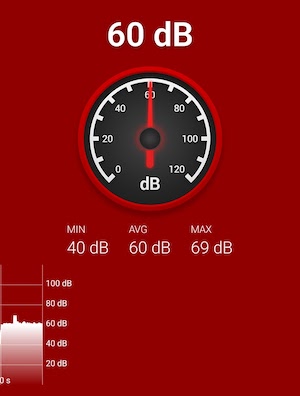
If the door to the water heater closet is closed, then the sound in the garage is a quiet low hum, anywhere from 42 to 48 dB depending on where the sound is measured. You can see a meter reading below from about 8 feet from the door, and listen to the sound here and here.
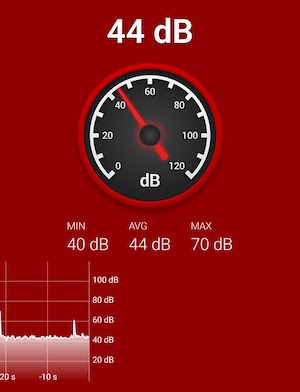
From inside the house, in the family room adjacent to the back wall of the closet, you can just barely hear a hum if you listen very hard. I have never noticed it, and neither has my keen-eared daughter. The sound meter might read 38 instead of 35 when there is no other ambient noise. You can listen to it here, though I couldn’t hear anything when I made that video. But when I listened very carefully as I used the water heater app to turn the heater off, I could hear a slight decrease in sound. (1)
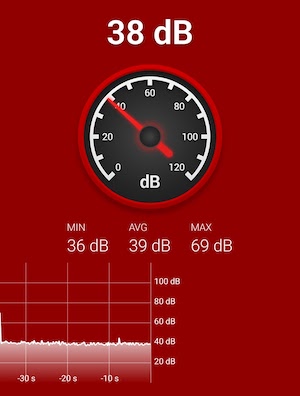
Operationally the water heater doesn’t use much electricity. If you look at the specs for the appliance, it generates 4200 BTU/hour of power when the compressor (heat pump) is running. That is equivalent to 1231 watts (1 watt = 3.41 BTU/hour).

Since the heat pump generates about 3.7 times more power than it takes in, that means it uses about 1231/3.7 = 333 watts. That is about the same as a coffee maker or plasma TV, according to this chart from Silicon Valley Power.
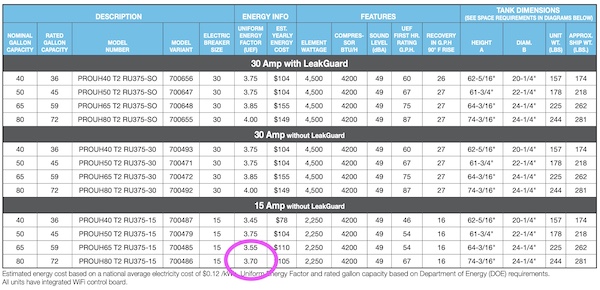
If a house has used a lot of water and the tank is substantially emptied, the resistance element will kick in to quickly fill up the tank. (2) That element uses about seven times as much electricity as the compressor, or 2250 watts, and would use double that if you have a 30-amp model! That is why you don’t want to have a very small tank. With an enormous 80-gallon tank and relatively low household hot water usage, our resistance element has never turned on in the 3+ months the water heater has been running. (3)
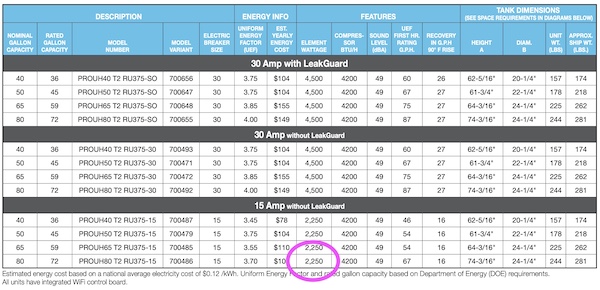
In practice, what does this look like? Below is a chart showing a typical day’s power draw (in kW). The pump ran three times for about an hour each at around 400 watts. Most days it runs at around 6am and 9pm because we have a recirc line -- hot water is sent through a recirculating line to minimize wait time for hot water in mornings and at night. It is on a timer and runs from 6-7:30am and from 9-10pm. You can see the heat pump’s compressor operating during that interval. During a busy day with several showers the heat pump water heater might run for 6 hours instead of 3-4.
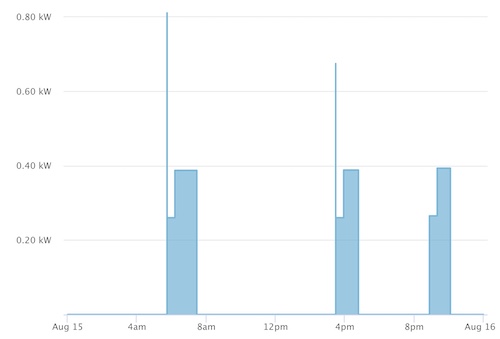
Below is a chart showing the water heater’s daily energy usage (in kWh) over the last 60 days. (Can you see when my daughter and her long showers came home?)
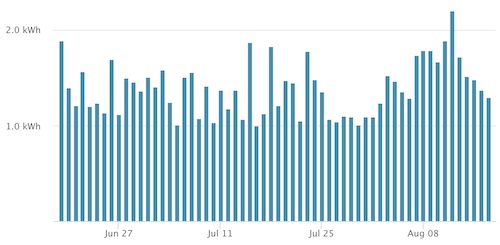
If you look at the last 12 days, energy use averaged about 1.7 kWh/day. Over the last 60 days, it averaged about 1.4 kWh/day. That is lower than I expected based on my gas water heater use. Last year’s utility bills suggested the gas water heater was using between one-third and one-half of a therm per day. That translates to between 10 and 15 kWh/day. But because the gas heater was only 0.63 efficient, and the hybrid heater is 3.7 efficient, I expected the hybrid heater to use between 1.7 and 2.6 kWh/day (10 * 0.63 / 3.7 and 15 * 0.63 / 3.7). But it’s using less. The weather has been warm, meaning the heater is running even more efficiently than average. I expect that during the winter, daily energy use will get closer to 2.5 kWh, especially when my daughter is home!
The cost to run the water heater for a month, at Palo Alto’s Tier 2 rate of $0.20/kWh, is somewhere between $9/month (if using 1.5 kWh/day) and $15/month (if using 2.5 kWh/day). Our gas water heater, at Palo Alto’s Tier 2 rate of around $2.20, cost between $22/month (if using one-third therm per day) and $33/month (if using one-half therm per day). At the Tier 1 rate of around $1.30, the cost would be between $13 and $20 per month. So the new heater is cheaper to operate, but it’s pretty negligible since we don’t use all that much hot water.
The only downside of this whole project was the installation cost. It cost about $4500 net to install. Materials were about $2500, labor was about $2500, the permit was around $500, extra soundproofing was around $500, and Palo Alto’s rebate was $1500. (4) That cost is okay for some households but absolutely not okay for others. Higher incentives are available in some areas, but costs must go down as more people install these. Sunwork installations are more moderately priced. The new federal incentives will help push the market along as will more aggressive state and local building codes.
Rheem/Ruud has two new “plug-in” models that should cost less to install because they require less electrical work. The HydroBoost seems to be the best fit for our area. It needs only a standard plug, and it uses higher water temperatures and a mixing valve to increase the effective capacity of the tank so that it is less likely to run out of water. The tank has no resistance element, so it refills at a rate of only about 12 gallons per hour. The other model they offer has an extra-large heat pump that fills the tank at a rapid 28 gallons per hour. However, it requires a dedicated circuit and I worry that the powerful compressor will be loud, though I haven’t heard any reports. If you are interested in that model, I would ask about the sound. AO Smith also has a new 120-volt plug-in model that is worth looking at.
Anyway, my heat pump water heater has been a non-event since it was installed. We don’t notice it, it works great, and the utility bills are slightly lower. I think in five years we are going to think it strange that anyone would bother to read a blog post about these appliances. They will just be standard and no one will care much about them. Palo Alto has already taken some steps in that direction by requiring remodels and additions to use them. It makes sense to avoid installing new long-lasting gas appliances when practical, as it is in these cases. With gas water heaters contributing about one-third of our household gas use in this area, switching to the heat pump water heaters can make a big dent in building emissions.
I’d love to hear your experience if you have installed one, or any questions you may have if you are considering one.
Notes and References
1. The wall between the closet and the family room is insulated and also has QuietRock on the garage side, glued with some sound-proofing glue. I’m not sure how much of a difference that made.
2. I am operating the water heater in the recommended “Energy Saver” mode. The “High Demand” mode will cause the resistance element to kick in more aggressively, for example if you have house guests and need to accommodate an unusual number of showers or other hot-water loads.
3. I know this because I have an Eyedro circuit monitor on the water heater circuit, so I can see how much electricity it is using and when. I recommend installing one of these if you get a heat pump appliance, since it can help you to understand your usage and ultimately your electricity bill.
4. These costs are approximate because the electrical work was combined with other things, as was the permit. The cost is also on the high side because the contractor did a bunch of drywall work in the garage in addition to installing the heat pump water heater.
Current Climate Data (July 2022)
Global impacts, US impacts, CO2 metric, Climate dashboard
Comment Guidelines
I hope that your contributions will be an important part of this blog. To keep the discussion productive, please adhere to these guidelines or your comment may be edited or removed.
- Avoid disrespectful, disparaging, snide, angry, or ad hominem comments.
- Stay fact-based and refer to reputable sources.
- Stay on topic.
- In general, maintain this as a welcoming space for all readers.




